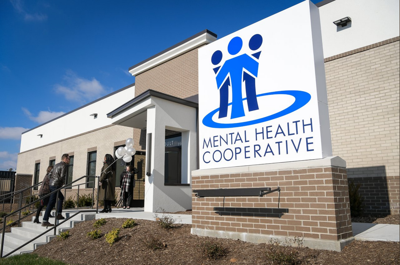
Mental Health Cooperative's Crisis Treatment Center
His body was found on an evening in late July by a group of people playing soccer. What had brought him to a wooded area near the Metro Soccer Complex in Southeast Nashville was unknown, just like his name.
The Metro Nashville Police Department asked for the public’s assistance in identifying the man in a July 28 press release. There were no visible signs of trauma on his body, police said. He appeared to be in his 30s and of Middle Eastern descent, with dark-brown hair and a full beard. He was wearing a white T-shirt with green shorts but no shoes.
You may not remember him. In the absence of many details about his death and the apparent lack of any foul play, the discovery of his body received minimal media coverage. He fell through the cracks of our attention in death just as he appeared to have fallen through the cracks of our society in life.
The police did eventually identify him. The MNPD tells the Scene that the medical examiner’s office reported finding medications in the deceased’s system that suggested he may have been treated for schizophrenia. A detective reached out to the Mental Health Cooperative to see if he might have received assistance from the nonprofit mental health agency. A caseworker recognized him and provided a possible name. It matched that of a man who was arrested in 2019 for criminal trespassing at a Waffle House on Murfreesboro Pike — a charge consistent with someone living on the streets or suffering from mental illness. Fingerprints from that arrest led to the identification of a 37-year-old man.
Metro police spokesperson Don Aaron says the man's family was notified, and that they told police he did have a history of schizophrenia and would sometimes wander off for days. A final autopsy report listed the manner of death as natural, with the cause of death being dehydration and malnutrition, with schizophrenia being a contributory cause. Hyperthermia, or overheating, could also not be ruled out as a contributing factor.
The exact details of one man’s life and the circumstances that led to his death are unique. But the discovery of his body near a soccer field on a summer evening is a tragic reminder of the way many among us can suffer in isolation.
The Mental Health Cooperative was started in 1993 and focuses primarily on serving low-income Nashvillians with mental health issues ranging from depression to schizophrenia and severe bipolar disorder. The nonprofit employs care management teams who provide support beyond medication — like helping people with access to health care, food, stable housing and transportation. They also run crisis services offering 24/7 assistance to people experiencing psychiatric emergencies. In 2019, the co-op opened its Crisis Treatment Center near MetroCenter, north of downtown.
Amanda Bracht is the MHC’s senior vice president of clinical operations. Without discussing individual cases for privacy reasons, she speaks to the co-op’s work and the challenges facing mental health workers now. There are gaps in our approach to the crisis, she notes, and they’re big enough for many people to fall through.
“There are services out there, but often people either fall through the cracks or they disengage,” Bracht says. “It’s not uncommon for someone with severe mental illness, particularly like schizophrenia, to have a crisis — they either get hospitalized or they have an interaction with law enforcement or they’re in jail. They get stabilized on medication, they get out, they engage in treatment for a little bit, but then something happens. They think they don’t need the medication anymore, or they have a stresser that they just can’t cope with, and the first thing that goes is follow-through with their treatment.”
In some cases, even when mental health agencies like the co-op manage to get back in touch with a former patient, the person has lost the ability to recognize their own need for treatment. A person can be deeply unwell without meeting the criteria for hospitalization or being committed for treatment involuntarily.
Since the co-op’s founding, Bracht says, Nashville has made progress, particularly when it comes to the communication and collaboration between mental health agencies and the law enforcement entities — like MNPD and the Davidson County Sheriff’s Office — that often interact with people suffering from mental illness. In September, Sheriff Daron Hall opened the new Behavioral Care Center, a 60-bed facility that will provide mental health treatment instead of a jail cell for people who are arrested and dealing with mental illness. Hall said at the center’s opening that around 30 percent of the local jail population struggles with mental illness.
The Mental Health Cooperative serves as the care provider for the Behavioral Care Center, and while Bracht cites that facility and the co-op’s Crisis Treatment Center as important steps, she also acknowledges that the current resources are not enough. Nashville’s population is booming, which means local agencies that are already strained are falling even further behind.
“I certainly see that in our crisis services,” Bracht says. “We’ve had year-over-year increases in the number of calls to our crisis line and people we’re seeing. Often it’s people who are brand-new to Nashville, who we have never seen before.”
That would be true even in a normal year.
“We’re playing catch-up in terms of trying to keep up with the actual demand,” she says. “Then you add a global pandemic on top of it.”
Update: The original version of this story mentioned the name of the man who was found dead in July. At the request of the victim's family, we have removed his name.





